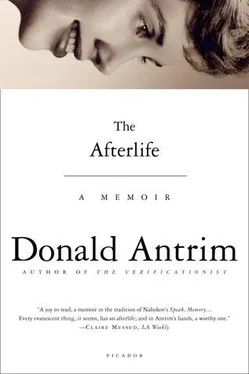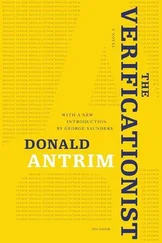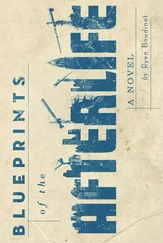“I’m not asking you to.”
“Don’t come into my home and attack my serenity. I don’t need your hostility. If you have something constructive to add to this conversation, go ahead. But if you’re going to tear me down and get at me with your hostility, that’s something I don’t need. You want to live in the past, and you want to drag me back into all that shit. You’re angry. You’re angry and you’re hostile.”
“Wait a minute,” I begged. And I went on: “In the first place, there’s a difference between anger and hostility.” What a mistake. My mother glared at me, and then turned away and looked at S., who, frankly, seemed terrified. She said to him, in a kind of scream, “I don’t need this hatred from my own child!”
And to me she said, “You can be a supportive member of this family or you can get out of my house.”
It was not long before I found myself lying on the carpet in my mother’s dining room, curled up, weeping. From time to time, I looked up and saw my mother or S., or the pair of them, peering out of their bedroom on the far side of the apartment. It was as if, like the cat, they were afraid to step into the room. Were they afraid of contamination? Contamination by the Past? I was the Past. The bedroom door would open a short way, and light would spill out, and, by that light, I could distinguish their figures. My mother looked tall and imposing in her plain white housedress. S., by contrast, was small and slight and wiry, a thin man whose gestures and movements, like his voice (and the cryptic signatures he gave his own paintings, and the haphazard research methods he would use, years later, to avoid properly identifying the painting in New York), conveyed his need to remain unseen, undetected, and, like the creator of the work that became his obsession, unknown.
I do not recall precisely how things played out over the remainder of that dismal trip to Florida. Nor do I recall at what point I became certain that S. and my mother were conspiring to leave the identity of the painting a mystery By the middle of 1989, the matter seemed to have been dropped.
Then, after what seemed a long stretch of time, I got a phone call. It was S. He said that he had something important to tell me concerning the painting, which, as it turned out, was still in the hands of one of the cousins. S. told me that he had been doing a lot of thinking about the painting. He told me that he was, by the way, grateful for my help during the months when he had worked so hard to establish the painting’s authenticity. But he had been wrong, he said, wrong about the painting. After much meditation on the problem, he had come to realize why he— we —had failed to identify the painting. He told me that this realization had caused him much pain, and a great deal of soul-searching. He told me that the painting was not what he had taken it to be.
Of the many silences in all the conversations I had with S. in those years — the years before he fell out of AA and out of my mother’s life — this seemed the longest. I held the phone to my ear. What was S. trying to tell me?

“Excuse me?”
“Frederic Church,” he said again.
Frederic Church? The Hudson River School painter? Nineteenth century? Owned that Persian-style mansion overlooking the Hudson in upstate New York? Famous for his landscapes? Spent some time in South America? Painted animals and birds?
“Frederic Church,” I said to S. “Thank you for telling me that.” And a while later we finished our conversation and hung up.
K. and I had, by this time, moved to another, smaller, apartment on the Upper East Side. For the better part of a year, I had been depressed, and our relationship — confined, as it were, to a space far too cramped to permit either privacy or a comfortable intimacy — was beginning to unravel.
“He says he now thinks it’s a Frederic Church,” I told her when, later that night, she got home from work, slammed the door to our apartment, and dumped her shoulder bag on the floor.
“Whatever,” K. said, capturing perfectly, I thought, the strange and sad and true essence of everything.
And, really, that should have been that. But there was more to come.
Over a year had passed since S.’s first trip north to look at the painting. Now, in early winter, he came back. For a period of months, he lived in Manhattan, in a Chelsea boardinghouse, a building, as I imagine it, similar to the one where years earlier this story had begun. It must, for S., have been something of a homecoming. Shortly before Christmas, my mother got on a plane and flew to New York for a weeklong visit. Together, she and S. camped out in his room. There was no phone; my communication with my mother was restricted to times when she could manage to fight the winter winds and get to a pay phone on the corner. Because her circulation was bad from smoking, this was a hardship for her. Also, she was beginning to have trouble walking. During the days, S. visited galleries and museum libraries. Of course, he came up with nothing.
I had thought, I remember, that this would be a good time for my mother and K. to meet. I suggested the idea to both of them. K. said she was ready to meet my mother, and my mother crowed at the thought of meeting K., whom she had spoken with on a few occasions, when I’d shoved the phone into K.’s hand and suggested that she say hello. But what was I thinking? Did I imagine that the four of us — my emphysemic mother, her passive-aggressive boyfriend, my increasingly fedup girlfriend, and I — would go out to a restaurant and order a meal together? Did I picture us sitting down like a family and talking about Leonardo da Vinci and Frederic Church? Nothing came of it. K. and my mother never met. And before I knew it my mother had packed her bags and gone home. A while later, S. was gone, too.
This time, though, he had something to show for his trouble. Of the cousins who at one time or another had, or had had, some connection to the painting, two were now dead, and a third — and this was not the man who had read the magazine article dedicated to the important painting — had gone ahead and given the painting to S. I learned from my mother that the cousin had said to S. something along the lines of “You’re the only person in the world crazy enough to give a damn about the thing. Take it.”
“What is he going to do with it?” I asked my mother during one of our long-distance phone calls. This was sometime in — I’m guessing — late 1990 or early 1991.
“I don’t know, Don. He says he’s going to put it in fine-art storage. He says he doesn’t know what else to do with it.”
“Does he still believe it’s a Frederic Church?”
“You’d have to ask him.”
In the summer of 1991, I moved out of the apartment I shared with K., and began a period of bouncing from place to place. For a while, I lived in a small rented room. At about this time, down in Miami, S. packed up and left my mother’s apartment. My mother told me later that he had begun drinking again; he wasn’t, according to her, in good shape. She bumped into him every now and then at AA meetings — he seemed to be in and out of the program — or spoke with him on the telephone. She said, in one conversation, that he had taken a job matching house-paint colors for a paint and hardware store. On another occasion, she told me that he was working as a sign painter. She did not have an address for him, but she believed that he was living somewhere out on Miami Beach. At one point, she told me that she thought he might be sleeping in his car. In the event, S. did not, she said, look as if he was getting much to eat. He was drunk a lot, drunk even when attending AA. He looked bad. She did not expect him to live long. She did not expect to see him around much, as time went on.
Читать дальше













